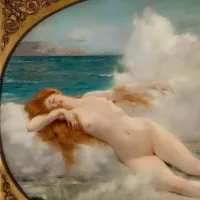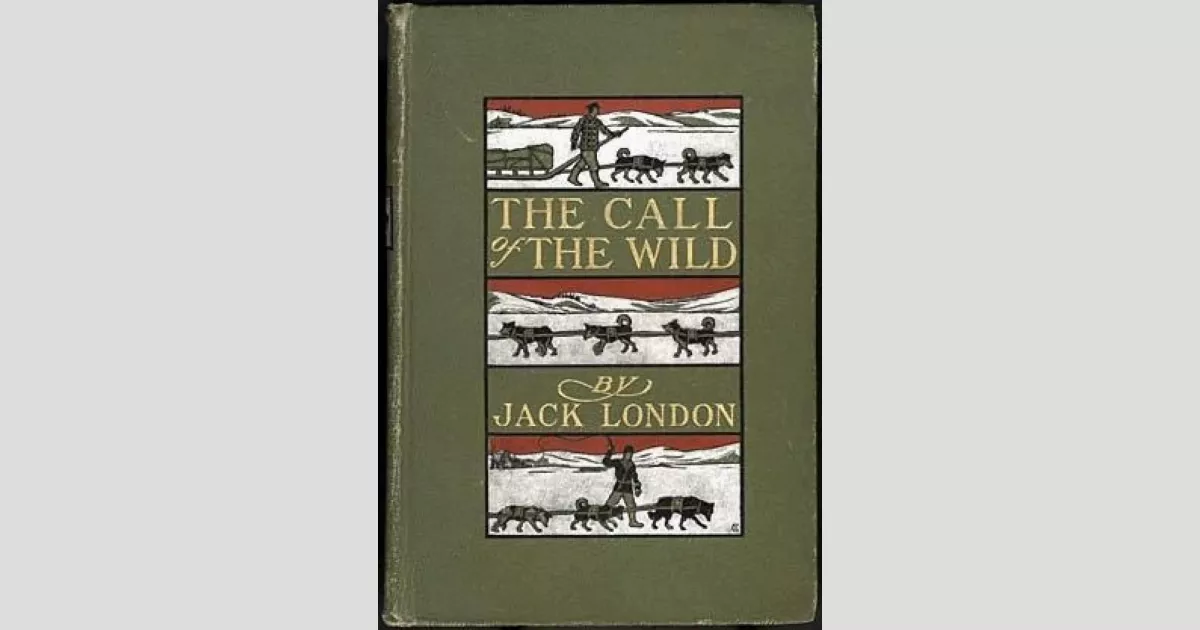"The Call of the Wild" by Jack London follows the story of Buck, a domesticated dog stolen from his California home and thrust into the brutal world of sledding during the Klondike Gold Rush. As Buck adapts to the harsh Yukon territory, he undergoes a transformation, shedding his civilized demeanor and embracing his primal instincts. Facing challenges of survival and dominance, Buck emerges as a leader, showcasing the enduring power of nature over nurture.
June 1902: Publication of "Diablo - A Dog"
London published a short story titled "Diablo - A Dog" in Cosmopolitan Magazine in June 1902. This story about a dog named Bâtard who kills his master is said to have inspired London to write The Call of the Wild as a way to "redeem the species" from this darker portrayal.
1902: Publication of John Myers O'Hara's "Atavism"
John Myers O'Hara's poem, "Atavism," was published in The Bookman in 1902. The first quatrain of this poem is used to open the first chapter of The Call of the Wild, foreshadowing Buck's reversion to his primal instincts when removed from his domesticated life in the Santa Clara Valley.
1903: First Film Adaptation of The Call of the Wild
In 1923, The Call of the Wild was adapted into a film for the first time, marking the beginning of its journey into cinematic interpretations.
1903: Serialization, Publication, and Sale of The Call of the Wild
Initially intended as a pulp fiction story about the gold rush, The Call of the Wild was serialized in five installments in The Saturday Evening Post for $750. The same year, London sold the full rights to Macmillan, which published the book. It has remained in print ever since.
1903: Publication of The Call of the Wild
Jack London's short adventure novel, The Call of the Wild, set during the Klondike Gold Rush, was published in 1903. The novel follows Buck, a dog stolen from his home and thrust into the harsh life of a sled dog in Alaska, where he must fight to survive.
1903: Critical Acclaim for The Call of the Wild
The Call of the Wild received significant praise upon its release in 1903. H.L. Mencken lauded London's writing, while The New York Times predicted its popularity, particularly among readers drawn to depictions of "dog fights." The Atlantic Monthly praised its raw and powerful narrative centered on Buck's journey.
1904: London Proposes "White Fang" to Macmillan
Following the success of The Call of the Wild, London proposed a new book to Macmillan in 1904. This book, titled "White Fang," would present a contrasting narrative, depicting a dog's journey from a wild state to domestication - a reversal of Buck's arc.
1935: Notable Film Adaptation of The Call of the Wild
A notable film adaptation of The Call of the Wild was released in 1935, starring Clark Gable and Loretta Young. The film took considerable liberties with the original storyline.
1993: Release of The Call of the Wild starring Rick Schroeder
A film adaptation of The Call of the Wild, starring Rick Schroeder, was released in 1993.
2023: Inflation-Adjusted Value of The Call of the Wild Serialization
The $750 London received for the serialization rights to The Call of the Wild in 1903 is equivalent to approximately $25,433 in 2023, adjusted for inflation.
Trending

2 minutes ago Medvedev to clash with Auger-Aliassime in Dubai semifinals at Duty Free Tennis.

3 minutes ago Friday's Weather: Snow Returns After Brief Mildness, Lighter Winds Expected, End of Workweek.

3 minutes ago Lindsay Lohan reflects on troubled teen years and rebuilding her life in Dubai.
1 hour ago Ameren Prices $400M Senior Notes, $900M Bonds for Grid Investment, Reshaping Debt
2 hours ago Pokemon Celebrates 30 Years: A Cultural Phenomenon with Multimillion-Dollar Cards

2 hours ago Daylight Saving Time 2026: Prepare to set your clocks forward and lose sleep.
Popular

Jesse Jackson is an American civil rights activist politician and...

Barack Obama the th U S President - was the...

Susan Rice is an American diplomat and public official prominent...

XXXTentacion born Jahseh Dwayne Ricardo Onfroy was a controversial yet...

Michael Joseph Jackson the King of Pop was a highly...

Kashyap Pramod Patel is an American lawyer who became the...


